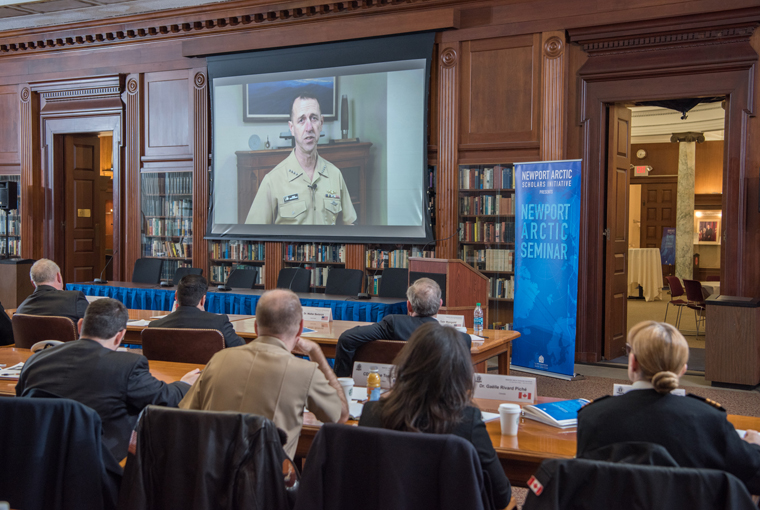A US-led naval Arctic security program is excluding Russia. That’s a big mistake.
ANALYSIS: U.S. law has banned most military cooperation with Russia since its 2014 annexation of Crimea. But a just-launched Arctic naval initiative is precisely the kind of forum where the two nations should be collaborating.

Scholars and sailors from six Arctic nations gathered at the U.S. Naval War College in April to begin a 13-month research program on Arctic defense and security.
The original announcement invited officials from the United States, Canada, Denmark, Finland, Iceland, Norway, Russia and Sweden to “address seapower-related research questions relevant to Arctic nations’ shared security and defense challenges.”
But Russia was excluded from the final agenda of the Newport Scholars Arctic Initiative because of a blanket provision in U.S. law that bans most “military to military cooperation” between the two nations.
This language has been included annually in the National Defense Authorization Act since late 2014 because of the Russian aggression against Ukraine.
The idea is that the U.S. military should not engage in practices that benefit the Russian military.
The Naval War College is part of the Department of Defense, leading the Trump administration to conclude that the prohibition should extend to this effort at collaborative research.
I understand the reasons why the U.S. does not want to do anything that could be interpreted as support for the Russian takeover of Crimea.
But including Russia in an effort to create Arctic policy does not fall into that category.
The law does allow for waivers by the U.S. Secretary of Defense to the ban on joint activities, when cooperation is in the national interest.
The Newport Arctic Scholars Initiative should be a candidate for a waiver because cooperation in the Arctic has never been more in the national interest.
Excluding a nation with territory extending from the Barents Sea to the Bering Sea from what is more of a diplomatic than military exercise is senseless.
For models of how nations with different views can cooperate and attempt to resolve conflicts, look no further than the United Nations or the Arctic Council.
The Arctic Council, which includes Russia and seven other nations, has negotiated important agreements on scientific cooperation, oil pollution preparedness and maritime search and rescue.
The Arctic Council does not deal with military security, evidence of the heightened sensitivity that attaches to questions of sovereignty.
The best way to defuse the potential for crisis is to communicate in an Arctic initiative designed to consider regional partnerships, stability, rapid response and access.
In his opening remarks at the April meeting, organizer Walter Berbrick of the Naval War College said the absence of Russia was a reminder that “actions in one region can have unanticipated consequences even in our north.”
“As the Arctic Ocean region becomes more complicated and interconnected, the potential for even more serious unintended consequences grows,” he said.
Berbrick, who heads the Arctic Studies program at the Naval War College, is co-chairing the initiative with retired Rear Adm. Lars Saunes, former chief of the Royal Norwegian navy.
Berbrick said that lasting peace and progress in the Arctic cannot take place without Russia’s cooperation and that he hopes for Russian participation in the future.
This is a critical moment for the world and for all nations with an interest in the Arctic, which is rapidly emerging as a maritime crossroads.
“My hope for this research program is to guide your national decision-makers in understanding the Arctic development to better consider risks and opportunities to ensure the peaceful, prosperous and safe development of the Arctic region and your nations,” Saunes said in his opening remarks.
“What’s happening in the Arctic has global consequences,” he said. “The Arctic must not become another highway of war. I hope this work will create the conditions for an avenue of peace.”
Berbrick said that threats to the northern shores of Arctic nations continue to evolve, so economic, defense and security relationships have to change.
“There must be a persistent effort between our citizens and between our navies — to listen and learn from one another,” he said. “If our relationship is solely defined by our differences, we only embolden those who seek total war rather than genuine peace.”
At a time when the declining sea ice in the Arctic Ocean has prompted the U.S. Navy to prepare a new report on Arctic strategy this summer, we need more regional efforts at cooperation, not less.
Columnist Dermot Cole lives in Fairbanks. Contact him at [email protected].
The views expressed here are the writer’s and are not necessarily endorsed by ArcticToday, which welcomes a broad range of viewpoints. To submit a piece for consideration, email commentary (at) arctictoday.com.